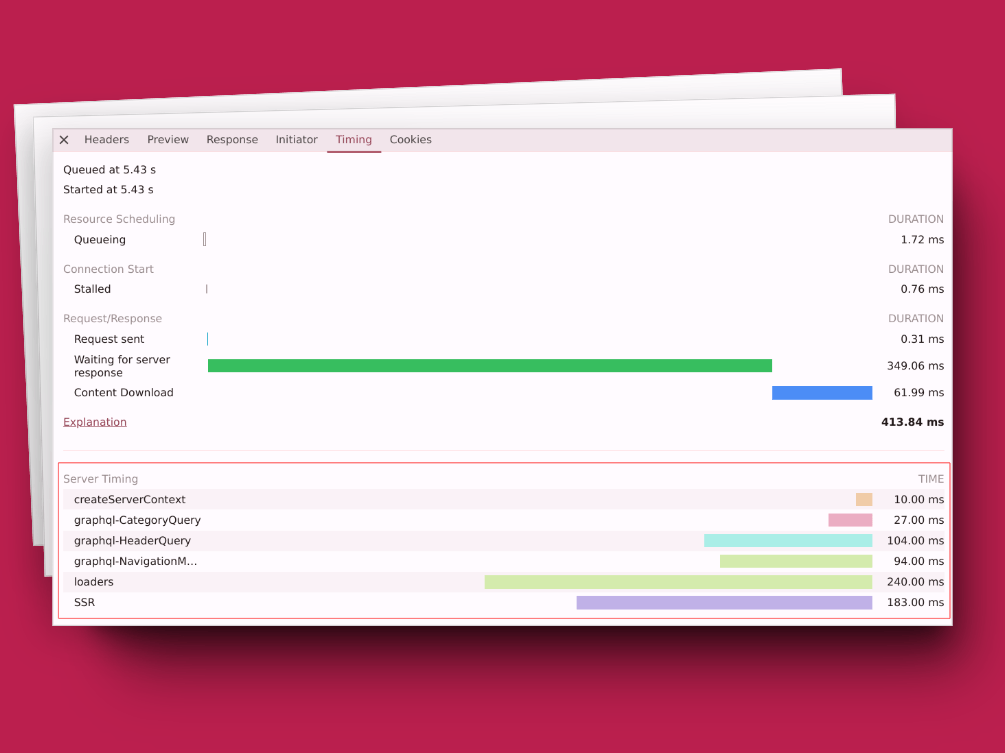Release: 3.6 & 2.31
A revamped Maintenance Mode, Cache Control, Server Timings, Summer Bug Hunt & More
Summer is here, and so is the new Front-Commerce release! 🌞
As you might know, Front-Commerce is now part of the Lundi Matin product family. This release is the first one under the Lundi Matin umbrella, and you will see that our focus hasn't changed: we are still committed to providing you with the best e-commerce experience!
Front-Commerce 3.6 introduces a range of practical tools that empower developers and operations teams in their day-to-day work.
- Enhanced Operations: Control downtime with
MaintenanceModeand automated health checks for remote services such as Magento. Manage caching behavior with theCacheControlservice, to ensure that your storefront is fast, always up and responsive even during peak traffic. - Performance analysis: Get a better understanding of your server-side
performance with
Server-Timingheaders. Front-Commerce provides fine-grained performance metrics to help you optimize your Time To First Byte by pinpointing bottlenecks. - Smoother Development: this release also addresses several edge cases of dynamic routing and HMR introduced in 3.5, making development smoother.
Our team has also been working on a Summer bug hunt. Tackling a backlog of bugs has resulted in numerous smaller fixes and improvements across the codebase, further enhancing stability and performance.
These are just a few highlights. Keep reading to explore the full details!
Easier Maintenance with a redesigned Maintenance Mode
Front-Commerce 3.6 brings Maintenance Mode features completely redesigned with
experience from the 2.x lifecycle. We wanted to rethink how maintenance mode
is handled in Front-Commerce, making it easier to manage and more robust.
Our new and improved MaintenanceMode service gives you more control and
automates some tasks:
- One-stop Shop: Control everything from a central
MaintenanceModeservice. No more edge cases and obscure behaviors! - Simple switch: In its simplest way, turn maintenance mode on or off with a single environment variable.
- External Tools Integration: For scripted scenarii, you can manage
maintenance mode from your favorite tools with the
/api/maintenance-modeendpoint. - Automatic Checks (Magento 1 & 2): For critical services downtimes, Front-Commerce now has built-in health checks that automatically trigger maintenance mode if something goes wrong, preventing customer frustration.
These improvements make maintenance smoother and less stressful, letting you focus on what matters most – running a successful online store!
Of course, developers can register new health checks for their own services, and
implement the most complex scenarios with the MaintenanceMode service. Read
more about it in the
Maintenance Mode documentation.
Performance Power-Up: Server Timings for your application
Front-Commerce 3.6 equips you with a new weapon in your performance arsenal:
Server-Timing headers.
Think of it like a performance stopwatch for your storefront. ⏱️
These headers give you precise insights into how long each part of your server takes to respond. You can view these timings in your browser's dev tools network tab, making it more convenient to identify slow areas and optimize them for a lightning-fast Time To First Byte (TTFB). 🚀
Front-Commerce's core is instrumented to provide detailed timings out-of-the-box for:
- Remix Loaders & SSR: Get a bird's eye view of how the time is spent in Remix's server-side rendering process.
- GraphQL Queries & Mutations: Measure the execution time of each GraphQL operations.
- DataLoaders: See exactly how your remote data fetching performs and discover caching issues.
We also provide a new ServerTimings service to help you record custom timings
in your application. Read more about it in the
Add your own Server-Timings
documentation.
Ready to make your store blazing fast?
Serve pages faster with Cache-Control headers
In this release, we wanted to address the complexity of managing Cache-Control
headers within Remix applications. We introduced a new CacheControl service
that simplifies the process of defining cache behavior in responses.
This service provides a simple API for developers to define Cache-Control
headers, taking care of the complex details behind the scenes.
Key benefits:
- Effortlessly define cache behavior: A user-friendly API lets you manage cache headers without writing complex Remix logic. Front-Commerce handles caching for both SSR and client-side navigation.
- Built-in safeguards: The
CacheControlservice automatically prevents caching of sensitive data like user information or dynamic content based on GraphQL results. It also deactivates caching in contribution mode. - Optimized performance: Out-of-the-box, Front-Commerce routes now have sane
defaults
Cache-Controldefinitions to ensure efficient caching for common routes like HomePage, PLPs and PDPs.
We highly recommend you to use this 3.6 upgrade as an opportunity to ensure that
your application sends the correct Cache-Control headers to improve
performance and reduce server load.
For more information, check out the
Cache-Control headers
documentation.
Flash messages
We brought Flash Messages to Front-Commerce 3.x! This feature, ported from the
2.x version, allows you to display temporary messages to users, such as
success messages after a form submission or error messages when something goes
wrong.
It was adapted to match Remix's idiomatic way of handling sessions, and is now
exposed in user.session object.
Read more about it in the Flash Messages documentation.
Other changes
We also made several changes in these releases, to improve existing features and fix bugs.
Features
-
Core:
- we added an
isAnonymousproperty on the sharedUsertype to programmatically know whether the user is authenticated or not - we added a new
onServerInitservices lifecycle hook. Unlike theonServerServicesInithook which runs on each request, this hook will only run on server start.
- we added an
-
GraphQL:
- we renamed mutation response types to follow a coherent naming convention
(
xxxMutationSuccesssuffix). It prevents naming conflicts between mutation names and types in tools such as Storybook. Read more about this change in the ADR. An automated codemod will help you migrate usages of updated type names. - it is now possible to define custom scalars in GraphQL modules
- we renamed mutation response types to follow a coherent naming convention
(
-
Remix:
- we now publicly expose SEO API from the
@front-commerce/remixpackage to allow reusing them when overriding SEO routes
- we now publicly expose SEO API from the
-
DX:
- we improved the server startup log to display useful information for developers (Front-Commerce version, local and remote URLs, environment …)
- we now allow session cookie for remote hosts in development mode. This enables login access using a remote host URL (e.g., http://172.25.59.22:4000, http://mysite.dev) instead of the default localhost (http://localhost:4000).
-
Authorize.net:
- Authorize.net payments now support the CVV field (
2.xonly)
- Authorize.net payments now support the CVV field (
-
Codemods:
- migration tools now properly migrates
limitRateByClientIpusages tolimitRateByGraphQLResolver
- migration tools now properly migrates
-
DX:
- implemented a config validator to throw early errors when an invalid
configuration is provided in
front-commerce.config.ts - we added an
eslintrule to disallow storybook virtual module imports outside of stories
- implemented a config validator to throw early errors when an invalid
configuration is provided in
-
Theme Chocolatine:
- refactoring: we renamed response value from
/api/checkout/shipping-methodsto use a consistent name:paymentMethods->shippingMethods. No change is needed when using theuseShippingMethod()hook. It's only an internal naming change. - replaced the
withPaymentErrorHOC in favor of data from loader after payment control
- refactoring: we renamed response value from
-
Lyra / Payzen:
- the Payzen Front-Commerce Payment extension now supports for Magento 2.
The
payzen()extension now requires a flavor. Example:payzen("front-commerce-magento1")orpayzen("front-commerce-magento2")
- the Payzen Front-Commerce Payment extension now supports for Magento 2.
-
Adyen:
- Adyen now supports automated payment notifications
Bug Fixes
In Front-Commerce 3.5, we introduced dynamic routing. It was a very advanced feature, that touched low-level internals of Vite and Remix. We received feedback from some users, who faced issues in development mode after the upgrade. These issues were all related to HMR and HDR. They're only detected in typical project workflows, involving theme overrides and different types of changes developers make on a daily basis.
These issues are hard for us to detect in our test suites and core development
tasks, due to their nature. We are grateful for the feedback we received, and we
are committed to improving the developer experience in Front-Commerce. We have
addressed these issues in this release (and sooner, with several 3.5.x patch
releases). Please, never hesitate to report developer experience issues: these
are bugs often as critical as functional issues … so be sure that we'll take
them seriously!
Thanks everyone for your patience and understanding. We're sorry for the inconvenience these issues may have caused to your development experience.
These bug fixes were also backported to 2.x when relevant.
-
DX:
- we pinned
reactandreact-domto a canary version to avoid hydration issues during hmr. See https://github.com/remix-run/remix/issues/4822#issuecomment-2130006831 for details. - we fixed an issue causing the server to exit when runtime errors occurred in development mode
- we fixed
HDRupdates in development mode to properly receive changes from loaders and actions - we fixed an issue which caused
HMRchanges to sometimes result in aRangeError: Maximum call stack size exceededwhen having circular importers - we fixed the "Error: No
routeModuleavailable" error which often occurred duringhmr/hdrreloading HMRnow works as expected on custom hostnames (hostnames that are notlocalhost, for examplemy-shop.local)ssrroutes now have updated data for a dynamic route afterhmrreloads
- we pinned
-
Global:
- we updated HTTP status code from
401to400in several packages. It prevents issues when the application is behind an HTTP authentication layer. Impacted packages:@front-commerce/theme-chocolatine,@front-commerce/contentful,@front-commerce/magento2and@front-commerce/core - public configurations are now available for all modules, after loading the
<FrontCommerceScripts />in theroot.tsx's<head>to ensure early initialization
- we updated HTTP status code from
-
Magento 1:
- we fixed a regression in the category batch function to allow batching more than 10 categories at once
- we fixed a regression for Admin OAuth credentials to restore admin REST interactions
-
Theme Chocolatine:
- fix a regression due to Vite, where the fullscreen gallery didn't show up on the PDP
- prevent the Login form submission to trigger other form submissions when the component is itself a child of a form (stop event propagation)
- users can now properly create an account after a guest checkout, and are properly redirected to their order
- fix an issue where
<QuickOrder>doesn't display all fetched products properly - fix virtual cart detection in the checkout to ensure shipping steps aren't displayed for carts only containing virtual products
- fix an issue where user was redirected to website home instead of checkout tunnel when registering from checkout tunnel
- fix an issue where email validation fails in wishlist share modal
- fix an issue where
<Skeleton>component SCSS wasn't loaded properly - When accessing register page, redirect the user to the user account page if he's authenticated
-
External login providers:
- fixed missing translations for social logins
- fixed missing react keys for social sign in providers
-
WYSIWYG:
- we replaced usages of an old library with inline implementation, to convert html inline styles properties to React-compliant names in Wysiwyg loaders
-
Adyen:
- iDeal payment method now works properly, thanks to missing field added to the GraphQL schema
- we fixed a regression during Adyen client SDK initialization, a
withAdyenCheckoutnow injects Adyen checkout library in a component instead the legacywindow.AdyenCheckoutLibapproach. It is more resilient to modern toolings and good practices
-
Stripe:
- we fixed an issue with Stripe IPN not using the correct additional data fields
-
Lyra / Payzen:
- the
PayzenEmbeddedFormElementnow usesclassNameinstead ofclass
- the
-
Paypal:
- the PayPal access token is now memoized properly in multi-store contexts
Fixes from 3.6 and 2.31 have also been backported into previous minor versions. The following patch versions were released: 3.5.5, 3.4.7, 3.3.6, 3.2.9, 3.1.8, 2.30.1, 2.29.3, 2.28.5, 2.27.7, 2.26.12, and 2.25.16.

